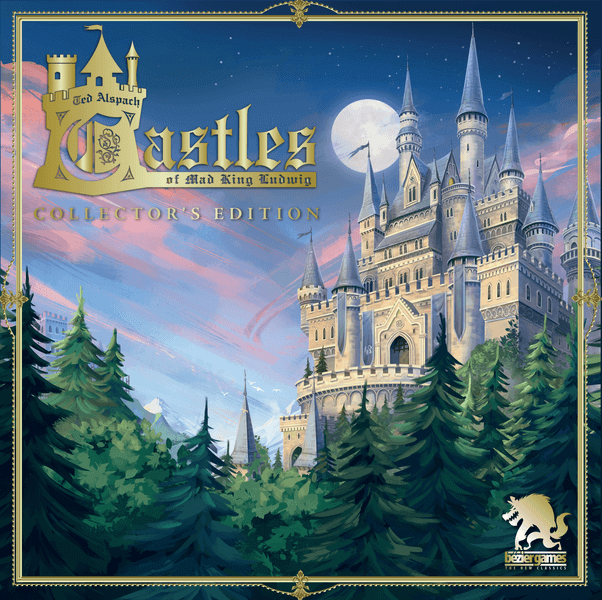
Lisbon
Lisbon is a strategy and city-building game set in the post-earthquake period, where players take on the role of noblemen seeking to rebuild the Portuguese capital amid uncertainty and opportunity. After the devastation of 1755, the Marquis of Pombal leads the efforts to rebuild the city, and players use his influence to collaborate with architects and engineers to create a new Lisbon. With a board depicting the city's historic center, participants must carefully plan the placement of buildings, taking into account building permits and economic dynamics. The game combines elements of programming and resource management, where every move can impact the income generated by the iconic buildings and stores. Each round, players can decide whether to place cards on their board or replace those available. Interactions with the game's characters provide different trading and building strategies, creating an economic engine that depends on the collective actions of the players. The ability to manage influence, licenses and resources is crucial to accumulating wigs, the symbol of success in Lisbon. The game ends after a fixed number of rounds, and the player who has accumulated the most wigs has become the great architect of the new Lisbon, one of the most emblematic cities in the modern world. Lisboa is the perfect combination of strategy and historical immersion, ideal for those who appreciate complexity and narrative in board games. Complexity: 4.59 / 5 (BGG 12/04/2023)Artists: Ian O'Toole;
Designers: Vital Lacerda;
Date: 2017
Note: 8.8
Mechanics: Fitting Parts, Open Buy, Hand Management, Influence / Majority in the Area, Solo
Topics: Economy / Production, Politics
Table of Contents
- How to Play
- Tips for playing
- Game mechanics
- Game components
- Additional Information
OBJECTIVE OF THE GAME
Tips for playing
Here are some tips for doing better in the game Lisbon:
- Focus on rebuilding Lisbon to maximize victory points, considering the balance between constructing public and private buildings.
- Use the nobles' action cards strategically to obtain critical resources such as gold, royal words and favors.
- Concentrate on completing set collections to get significant additional bonuses.
- Don't neglect the use of decrees for long-term objectives, as they can be decisive in the final score.
- Carefully plan your actions on the building board to maximize efficiency in the placement of stores and buildings.
- Constantly monitor the scoring opportunities offered by public buildings and the potential score for rebuilding the city.
- Pay attention to resource costs, adapting your strategy according to the offers available on the market.
Video about the game
GAME mechanics
- Hand Management: In Lisbon, each player has a hand of cards representing influential characters and actions available. Players must carefully choose which cards to play to maximize their efficiency and align their actions with their strategic goals. Playing a card can mean activating your power, acquiring resources or constructing buildings, so effective card management is crucial to balancing personal initiatives with collaboration and competition between players.
- Placement of parts: Lisbon uses a building placement system on the central board, where players build structures to help rebuild the city after the 1755 earthquake. The strategic placement of these pieces is vital, as each building influences adjacent areas and offers bonuses that contribute to the players' score and skill throughout the game.
- Influence / Majority in the Area: Players compete for influence in Lisbon's various districts, placing their buildings and establishing a political and economic presence. Controlling areas can grant significant privileges, such as access to special actions or bonuses, so vying for the majority in strategic locations is a central element of the competition.
- Open Buy: In this game, resources and project cards are available on an open market, where players can plan their acquisition actions based on the visible offer. This transparency requires players to make tactical choices and adjust their strategies based on opponents' decisions, as well as managing their capital and resources efficiently.
- Solo: Lisboa offers a solo variant where the player competes against an automaton that simulates the presence of an opposing player. Solo introduces unique challenges, forcing the player to optimize their moves while dealing with unpredictable actions from the automa. This mode preserves the essence of the multiplayer game, encouraging deep strategic decisions.
Game components
See all the items in the game below Lisbon:
- 1 Tray
- 1 Instruction Manual + Solo Guide
- 4 Player Help
- 4 individual trays
- 60 Resource Disks: 15 Gold, 15 Fabric, 15 Books, 15 Tools
- 55 Réis coins: 30 "1 Real", 20 "5 Réis", 5 "10 Réis"
- 20 Project Sheets
- 16 Double-Sided Public Buildings
- 22 City sheets
- 5 Mini City Cards
- 4 Score Sheets
- 12 Royal Favor Chips of the 3 Nobles
- 37 Clergy files
- 1 Cardinal's Meeple
- 82 Policy Letters
- 12 Ship Charts
- 70 Letters of Decree
- 63 Rubble Cubes in 3 Colors
- 1 Treasure Marker
- 4 Price Markers
- 8 Discs in the Colors of the 4 Players
- 20 Rubble Set Markers in the Players' Colors
- 4 Cutlery Meeples in the Players' Colors
- 32 Officers' Meeples in Players' Colors
- 32 Wooden Houses in the Players' Colors
- 1 Starter Player Sheet
- 1 Clergy file bag
- 1 Bag for rubble cubes
- 1 Building "Penthouse" for 2 Players
- 12 "Deck for Beginners" cards
Additional Information
- Ludopedia link: https://ludopedia.com.br/jogo/lisboa
- Link Tabletopia: https://tabletopia.com/games/lisboa
- Amazon Brazil link: Comprar Lisboa
- Amazon USA link: Comprar Lisboa


